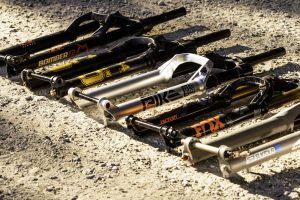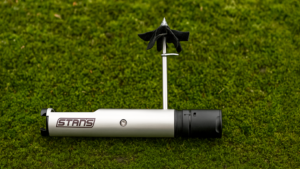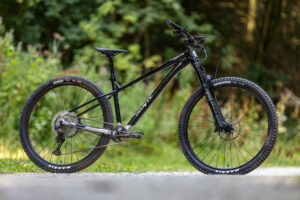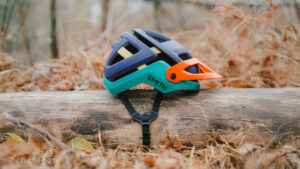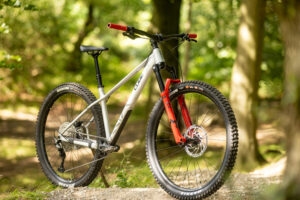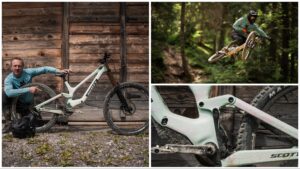The new Yeti SB120 is longer, slacker at the front, steeper at the seat tube and has 5mm more travel too.
Yeti SB120 T-Series T1 review
The top-line Yeti SB120 T-Series T1 is now longer, slacker and has more travel – as the name suggests. And it’s comfortably one of the best down-country bikes on the market.
Need to know:
- Wide size range: XS, S, M, L, XL, XL
- Size-specific carbon layup and proportional geometry
- T1 uses flagship Turq carbon. Cheaper C2 versions also available.
- Switch Infinity suspension provides 120mm rear travel, with 130mm fork travel.

Each frame size uses different carbon layups and tweaked geometry including proportional rear centre measurements to maintain character
Yeti’s SB115 platform always felt like a compromise. The suspension was great, but it was too heavy for a bike with a short reach (450mm on a large) and XC angles. It was something of a head scratcher then, given that the SB150 is such a progressive Enduro crushing favourite.
The immediate good news then is that the new SB120 is 25mm longer in reach, over a degree slacker in head angle and 2.5º steeper at the seat tube. All positive shifts in the geometry and sizing then. Oh, and as you’ll guess from the name, travel is up 5mm too.
More critical than the increase in travel is that the suspension layout has literally been re-aligned with the longer travel SB bikes. The twin Fox Kashima shafts of Yeti’s unique Switch Infinity suspension system are now inline rather than transverse, relative to the front triangle. This puts them in an open window above the BB, rather than being hidden away behind a door – so what you lose in neatness you gain in easy access.

Yeti’s Switch Infinity suspension delivers 120mm travel, and is paired with a 130mm fork
And that’s not the only update. The latest V2 version of Switch Infinity uses new hardware, seals, grease injected bushings and collet axle pivots, combined with lifetime warranty Enduro Max bearings pressed into the short forged linkages. Taken together, this should increase durability in what was arguably the Achilles’ heel of the design.
Other practical facets include a SRAM Universal Derailleur Hanger, tubed in tube internal routing, and a removable dual density skid plate under the down tube to help cable access. The lower portion of the downtube, just in front of the BB, has also been elevated, compared to previous bikes which had a jarring habit of ‘sumping out’ on rocks and logs.
The alloy shell for the threaded bottom bracket includes chain guide mounts and is co-moulded into the carbon frame during construction, rather than bonded in afterwards. Like the Tallboy that helps put frame and shock weight at over 3kg, and like Santa Cruz, Yeti backs it up with a lifetime warranty. If weight saving is your ultimate goal, there’s a raw carbon option that forgoes paint to save a few 100g.
Suspension
In a nutshell, Switch Infinity is a floating single pivot design, where the main pivot migrates upwards as the suspension compresses until it reaches an inflection point at around 40% travel. It then moves down to kill off the anti-squat and reduce pedal kick deeper in the travel.
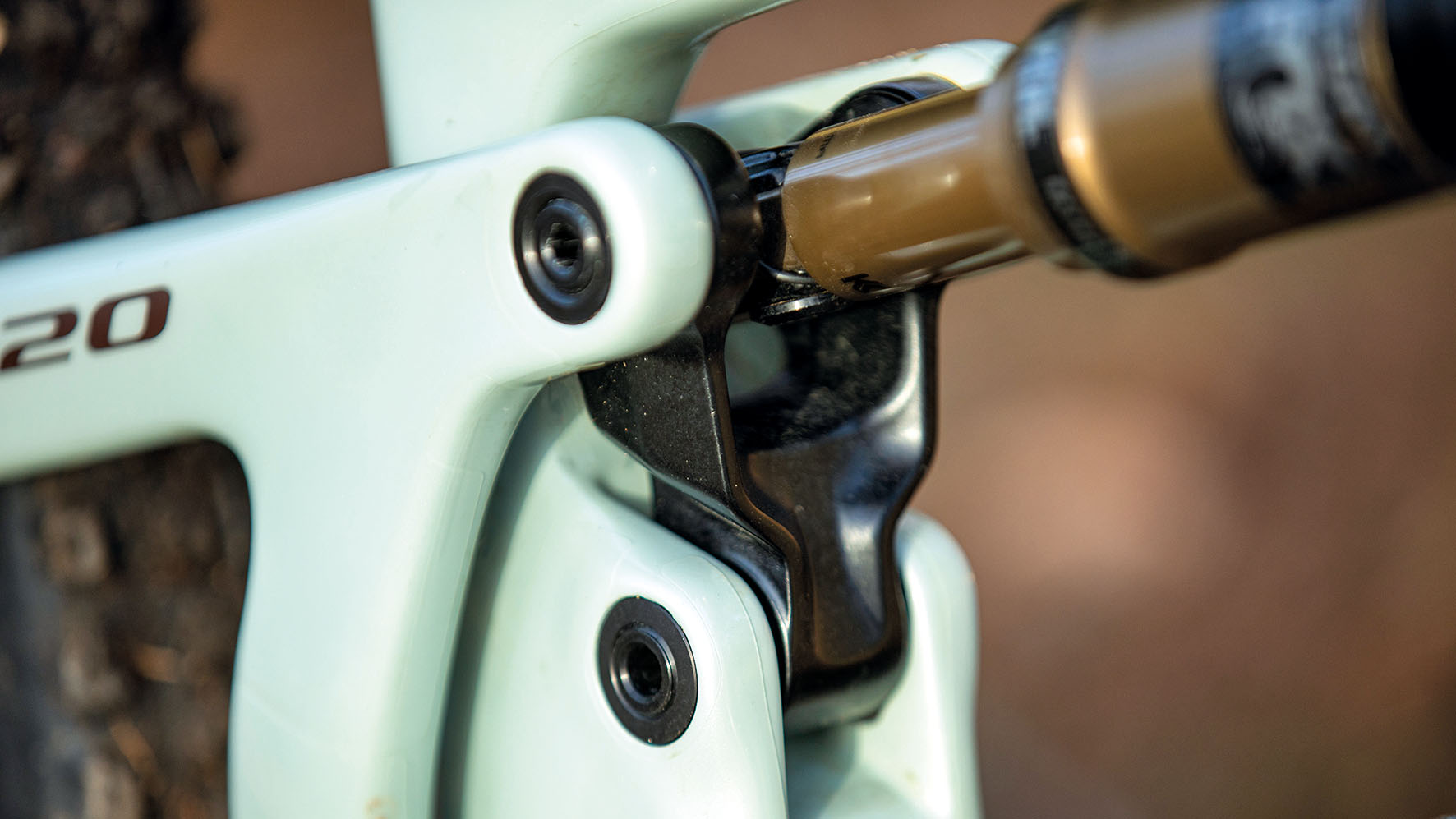
The packaging of the design is super neat and paired with the Fox Float DPS Factory shock the suspension on the SB120 offers a great balance between creature comfort and support for wild rides. To better balance vertical wheel travel front and rear, Yeti specs the excellent Fox Factory 34 Grip 2 fork with 130mm travel.
Components
Fox also supplies the Transfer Performance Elite dropper post, which is identical to the Factory version on the PIvot, minus the gold Kashima finish to match the shock and fork.
The SRAM 12-speed GX transmission is cable actuated, not wireless as on the Santa Cruz, but it offers slick shifting you do get carbon cranks so that one-ups the Pivot.
In the US there’s an optional DT Swiss carbon wheel upgrade, but that’s not available in the UK, so you get the same epically durable, but chunky 2kg alloy DT Swiss XM1700 wheels as on the Pivot.
The wheels are fitted with a big 2.5in Maxxis DHF front tyre, so even with a slimmer 2.3in Aggressor on the rear, the Yeti has the heaviest total bike weight on test, at 13.3kg (29.3lb). Because the rear suspension is so good, none of our testers even complained about the Aggressor rear tyre that we’d normally swap out straight away.

Yeti is clearly a fan of strap-on-cargo – with no internal storage on the SB120, SB140 or SB160
Performance
What’s most impressive about the SB120 is its ability to take a relatively average component spec, well it is for this kinda money, and make it feel fantastic everywhere on the trail. The way the supple suspension is stable under power gives a really positive pedalling feel. Nudge something hard enough to flip the Switch Infinity system into its retrograde phase though, and the suspension kicks back less and sticks to the ground more. The result is a seemingly sentient rear wheel feel that shifts from ‘lift and launch’ responsiveness to glued down traction exactly where and when you need it most.
The way the Yeti flows and floats on supple small bumps, where the response from the shock and fork flatter the easy roll of the DT Swiss wheels makes it a joy to ride. The mobile suspension feel and longest measured travel on test means it holds speed easily through random rock/root/drop/square hit sections too.
It’s superbly balanced too, the more supple Fox 34 fork and tuned frame feel were also an instant and welcome relief when switching from the Santa Cruz, and even the ODI grips feel extra lovely on the carbon bars.

The T1 bike uses the flagship Turq carbon, but there are also C2 frames using a cheaper, slightly heavier construction.
Now, if you’re concerned the SB120 sounds like a cruiser not a charger, don’t worry. There’s still enough muscle in the frame and fork to really push that big DHF tyre up front. Click some compression damping onto the fork and flick the easy to reach shock lever across to the medium setting, and there’s plenty of support for dropping your heels and driving through turns, popping off features or pumping rollers.
And while overall suspension progression on the SB120 is relatively low at 11% (longer travel Yeti’s use higher numbers), we had no trouble with the shock bottoming or sudden slams/ricochet at full travel either.
Switch Infinity is naturally more tolerant of adequate rather than accurate pressure and compression set up too, so finding a good set up is child’s play. Balancing rebound against the rise and fall behaviour isn’t quite as straightforward though. So during your initial rides you might get some unexpected hops and pop ups pulling from deep in the travel under power, but it’s easily remedied by simply adding a click of two of rebound damping. The shock also runs higher pressures than the other two bikes on test, which might become an issue if you’re a really heavy rider.
Unsurprisingly, there is a point where the head angle of the Yeti starts to lose line holding and stability when compared to a slacker bike. You’ll have to be pushing very hard and fast to get there though. The frame is tough enough to handle those situations just fine if you want to install an angle adjust headset to rake the steering out a touch. It’s horses for courses though, as the steepest head angle on test combined with the steep seat angle made the Yeti keen to track twisting turns and slot technical challenges at slower speeds better than most.
UK ‘downcountry’ fans with deep pockets will be disappointed to discover that the kilo lighter, $12,100 T4 build with its Transfer SL post and carbon DT Swiss wheels running faster Maxxis Rekon tyres isn’t available in the UK. But that didn’t stop us switching to a similar wheelset for a few longer rides, where we discovered that the angles make even more sense and the Yeti’s appetite for acceleration and altitude gain became even more obvious.
That means going lighter is definitely a valid direction to upgrade the T1 in, or, if you’re going down the custom build route, lighter is probably better.
- Best mountain bikes under £3000 / $4000
- Best torque wrenches for mountain bikers
- Mountain bike upgrades (that don’t cost the earth)
Verdict
Rather than push a specific agenda down your throat, Yeti sells the SB120 with the slogan “definition ready”. It’s a very apt undersell for a bike that’s quite happy to take a back seat in terms of obvious character traits while simultaneously being efficiently fast, comfortably forgiving, hyper grippy and effortlessly controlled. Playing with the compression settings proves it’s got the muscle and support to be rallied properly hard too, while a lighter wheelset unlocks its full speed and distance potential. So as long as you don’t insist on internal storage or geometry adjustment, Yeti ticks all of the boxes in terms of ride quality and all round versatility.








